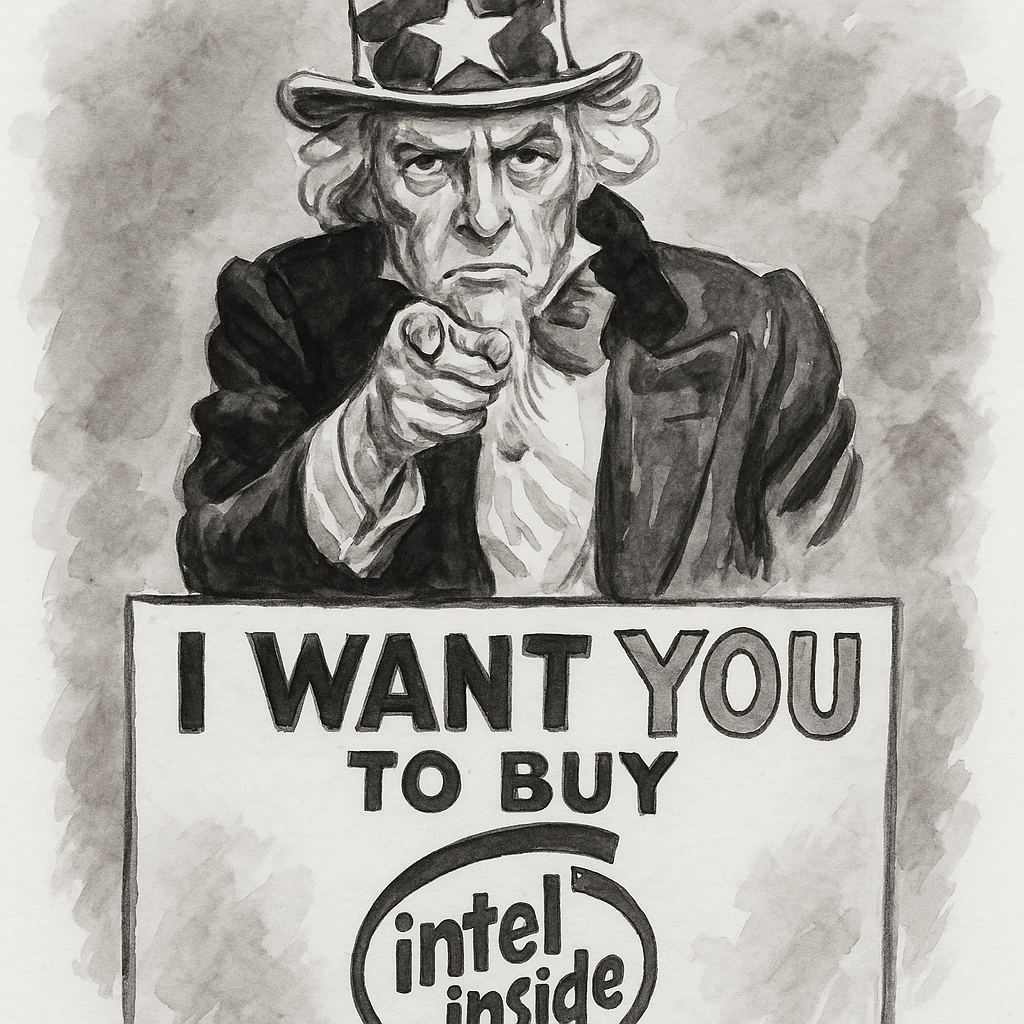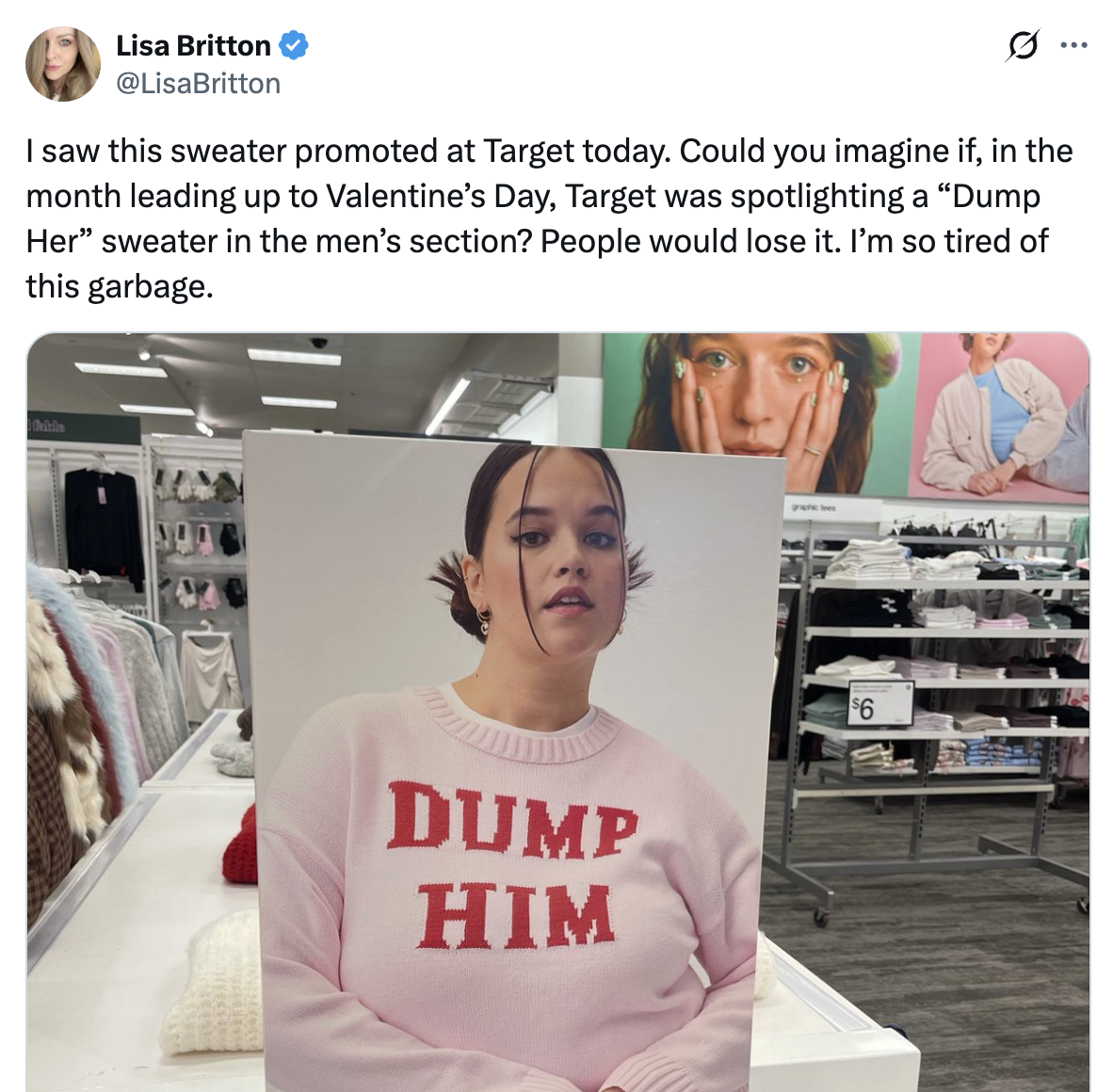
Uncle Sam and T-Swift Both Went to Jared

Welcome to Wednesday, futurists.
I’ve been to enough conference dinners to know the truth: the real conversations never happen over rubber chicken. They happen after.
That’s why I’m hosting Future Commerce After Dark in Chicago during Shoptalk Fall. We’ve taken over the California Clipper — a place with just enough grit and soul to match the night. Expect live blues, comedy, and a room full of people who don’t want to end the night talking about booth leads.
Come hang out with us. Doors at 9:00pm. We’ll go late.
👉 HIT THE LINK: https://luma.com/ShoptalkFall2025AfterDark

Uncle Sam just traded his checkbook for a cap table.
Last week's Intel deal wasn't your typical CHIPS Act handout: it was a $11.1 billion equity play that gave the federal government nearly 10% ownership in America's most strategically important semiconductor company.
Treasury Secretary Scott Bessent framed it as "creating assets for the American people rather than debt," but what he's really describing is the birth of the world's most powerful sovereign wealth fund.
The implications ripple far beyond silicon wafers. Bessent hinted that pharmaceuticals and supply chains could be next targets for government investment, while Howard Lutnick's excitement about potential defense industry stakes suggests an appetite for equity that would make Sand Hill Road blush. Even Nvidia CEO Jensen Huang found himself in conversations with the administration about bringing chip manufacturing stateside, though those talks have since stalled.
It's a fundamental reimagining of capitalism's relationship with the state.
The hosts of the All-In Podcast, including White House AI and Crypto Czar David Sacks, have long advocated for this exact approach: government as investor rather than grantor, building strategic assets instead of burning taxpayer money on subsidies that disappear into corporate balance sheets.
But the political calculus is messier than venture math, with illiquidity periods much longer than 10 or 12 years.
Congressional Republicans find themselves torn between free-market orthodoxy and national security pragmatism. The same politicians who rail against government overreach are suddenly faced with the reality that China's state-backed semiconductor ambitions require an American response that transcends traditional conservative ideology.
The question isn't whether this approach will expand—Bessent's hints make that inevitable.
Because in a world where economic competition and national security are indistinguishable, the government's portfolio performance isn't just about ROI…
It's about sovereignty itself.
— Phillip


Swifty Wedding Watch Begins. “Your English teacher and your gym teacher are getting married.” A single sentence, paired with a garden-chic photoshoot, quickly garnered 30 million likes, 2.3 million reposts, and 9.7 million shares on Instagram. But the official engagement announcement of Taylor Swift and Travis Kelce did far more than send Swifties into a tizzy; it kick-started a long-term commercialization play that brands of all sizes will aim to capitalize on.
Within minutes, fans clacked away on their phone screens: “Who did the ring?!” “What is she wearing???!” And social media sleuths delivered, offering everything from specific designers, SKUs, and prices. (If you’re curious: Kindred Lubeck of Artifex Fine Jewelry, and Ralph Lauren, in that order.)
Of course, this isn’t a new way for fans to bring their parasocial relationships with celebs to the next level. The general public, the lowly plebeians, have long paired gossip and commerce to feel closer to the celebrity elite. It’s why “black sheep sweater diana” is still a common search phrase on Google. And it’s why an LK Bennet dress worn by the Duchess of Cambridge repeatedly sold out. Expect brands across the spectrum, from obvious bridal brands to adjacent players, to ride the social media wave and leech off of fan excitement. In fact, it’s rather good timing that American Eagle just launched its collab with Kelce, isn’t it?
🔮Commerce sleuthing was how Travis and Taylor’s relationship began. Fitting that’s how the next phase begins…

The Multiplayer “Debrand.” Cracker Barrel found itself in hot water this week after unveiling a new logo that dropped its longtime “Uncle Herschel” mascot and the words “Old Country Store.” The refresh was meant to modernize the brand, but it was quickly panned as “generic,” “soulless,” and “bland.” And, like many things lately, the cultural trend quickly became a political movement, with X users, political commentators—ahem, the PRESIDENT—and media entities framing the rebrand as a pivot away from American heritage and a commitment to “woke-ism.”
The company acknowledged the criticism, sharing in a series of social posts that it is reversing course and keeping its old logo in place. The entire kerfluffle is just the latest case of culture and commerce being politicized, but it also indicates a much larger pushback on modern brand aesthetics.
Our Take: Brand strategist and DTC advisor Ashwinn Krishnaswamy (@shwinnabegobrand on Instagram) ran a lo-fi poll on Instagram to gauge his followers’ thoughts on the rebrand, and the response was unanimous: it was “absolutely criminal work.” Paired with Cracker Barrel’s recent interior design overhaul, the brand has become a bare and clinical version of its former self, eliminating the personality and rich history that many consumers claimed to hold dear.
Meanwhile, self-described citizen journalist Asra Nomani points out in a thread on X that there is an ongoing saga with none other than Steak ‘n Shake CEO Sardar Biglari, a minority shareholder in Cracker Barrel, who has in recent months taken on an activist role in search of a board seat at the company. This describes the strange beef (pun intended) brewing between the two restaurants, with the burger chain calling for Cracker Barrel CEO Julie Fells’ firing on social media last week. Speculations presume that the brand’s bad behavior is a cover for the existence of a nondisparagement clause between Biglari and the company.
Biglari’s investment group is a major investor in Cracker Barrel and owned as much as 9.3% of the company as recently as February 2025. It has long opposed the remodel campaign and rebrand, with many open letters and slide decks stating its dissatisfaction dating back to as early as October 2024.


Denim Capital. Urban Outfitters (UO) has launched the second installment of its On Rotation program with Levi’s. Available through September 30 in select stores and online, the curated denim drop and installation features new silhouettes, such as Levi’s Super Baggy Barrel and Low Loose, as well as archival gems.
The On Rotation concept was first launched in May 2025, with UO partnering with Nike to design an experience that fueled “discovery, inspiration, and authentic connection.” This latest iteration features visual merchandising components and an assortment reminiscent of a vintage Brooklyn flea market, showcasing UO’s continued penchant for hipster-based nostalgia. Together, these components reaffirm UO’s playbook for cultural stickiness, showing how the brand curates partnerships and collections to elevate the best of culture and commerce.
The launch is well-timed, especially since Levi’s is experiencing its own brand resurgence. The denim giant recently reported its thirteenth consecutive quarter of global direct-to-consumer comparable sales growth and has been able to capture mind and wallet share thanks to two successful campaigns featuring Beyoncé and Shaboozey.
De Minimis, Magnus Impact. Starting Friday, small imports valued at less than $800 will now face tariffs, closing a decades-old loophole in US trade law. The “de minimis” exemption, created in 1938 to eliminate customs paperwork on $1 items, ballooned into a pipeline for $65 billion worth of low-value imports in 2024, most from China and Hong Kong. Shipments originating from China and Hong Kong lost their de minimis benefits in May. However, now those tariffs are being extended to more countries, and packages will be taxed at rates ranging from 10% to 50%. In response, carriers will be temporarily able to choose a flat rate of $80 to $200 per parcel instead.
The move has been a cornerstone of President Trump’s effort to reduce reliance on foreign goods, but it has already snarled global shipping: more than a dozen countries, including the UK, France, Sweden, Finland, and Germany, have paused U.S.-bound mail.

Stirring the (Coffee) Pot. Keurig Dr Pepper (KDP) has inked an $18 billion deal to acquire Dutch coffee and tea giant JDE Peet’s. The company hopes the deal will reverse its 0.2% quarterly decline in net sales and rejuvenate its portfolio. Once the deal is closed, the empire will split into two US-listed companies: a $16 billion coffee powerhouse and an $11 billion beverage player. The merger-then-breakup marks a reversal of KDP’s 2018 mashup of soda and coffee, which analysts already found “odd.” The conscious coupling-then-uncoupling approach is growing increasingly common, especially in CPG; Coca-Cola is also exploring the sale of its Costa Coffee brand.


Downward Bot. Lululemon is betting on a new AI exec to turn around the once-leading athleisure brand. Ranju Das has been named the company’s first Chief AI and Technology Officer. Das brings experience from Amazon, OptumLabs, and Barnes & Noble to support Lulu’s ambitious AI goals, including ramping up personalization and product development cycles. CEO Calvin McDonald said in a statement that AI would be key to “agility and speed to market,” echoing the common narrative among retail CEOs who are praying at the altar of AI to drive revenue and shareholder value. But while companies like Walmart are using AI to reinforce their market position, Lulu’s executive changeup seems more like a Hail Mary.











.svg)
